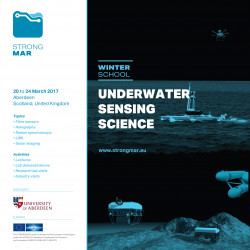Winter School on Underwater Sensing Science
INESC TEC is strongly committed to become a centre of excellence in maritime technology and, in particular, deep sea technology. It is strategically located, with fast access to deep sea, it has been steadily building up its skills, capabilities and resources, and is presently in the process of implementing an open research infrastructure (TEC4SEA), thus preparing itself to become capable of providing services and open access to the European academic and industrial communities and, thus, become a recognized European maritime research asset. The STRONGMAR project aims at creating solid and productive links in the global field of marine science and technology between INESC TEC and established leading research European institutions, capable of enhancing the scientific and technological capacity of INESC TEC and linked institutions (as well as the capacity of partnering institutions involved in the twinning action), helping raising its staff’s research profile and its recognition as a European maritime research centre of excellence. These objectives will be fulfilled through a set of measures: summer schools, winter schools, short-term scientific meetings, long-term staff visits, networking meetings, workshops, conferences, technology transfer workshops with stakeholders, and other dissemination activities. Therefore, the STRONGMAR project places INESC TEC as the pivot of a network of excellence, involving four European partners which are international leaders in deep sea technology. The STRONGMAR project is coordinated by INESC TEC (Portugal), and the consortium comprises CINTAL (Portugal), the Heriot-Watt University (Scotland, United Kingdom), the NATO Science & Technology Organization (Belgium), the Universitat de Girona (Spain) and the University of Aberdeen (Scotland, United Kingdom). The training strategy is based on sessions touching multidisciplinary aspects, followed by sessions focused on specific fields of expertise, allowing researchers to improve their knowledge and preparing them for the research and implementation challenges in the sea harsh environment. The Winter School on Underwater Sensing Science was organized by our partners from the Optical Research Group, School of Engineering, Aberdeen University. It was held from the 20th to the 24th of March 2017, and comprised the following lectures and lab demonstrations: Lectures • Introduction to holography, Prof. John Watson • Applications of holography underwater, Dr. Nick Burns • Introduction to Raman spectroscopy, Prof. Johannes Kiefer • Raman spectroscopy for underwater sensing, Prof. Johannes Kiefer • Introduction to LIBS, Prof. Javier Laserna • LIBS for deep sea applications, Prof. Javier Laserna • Sonar imaging, Dr. Jeff Chambers & Dr. Pauline Jepp • Fibre optical distributed chemical sensing, Mr. Jon Oddvar Hellevang Lab visits and/or demonstrations • Holography Lab, Aberdeen University campus; Prof. John Watson, Dr. Nick Burns & Dr. Thanga Thevar • RGU Fibre Sensor Labs, Robert Gordon University campus; Dr. Prabhu Radhakrishna • LIBS Lab, Aberdeen University campus; Dr. Thanga Thevar & Prof. John Watson • Oceanlabs, Aberdeen University, Newburgh; Mr. John Polanski & Dr. Stewart Chalmers • Teledyne Bowtech, Dyce; Dr. Brian Hector The school participants were all students and researchers from 3 different centres of INESC TEC, namely the Centre for Applied Photonics (CAP), the Centre for Robotics and Autonomous Systems (CRAS) and the Centre for Information Systems and Computer Graphic (CSIG). More information at www.strongmar.eu
Keywords
winter school, training, learning, twinning, R&D, cooperation, data processing, research, development, testing, field trials, robotics, underwater technology, underwater robotics, underwater sensing, underwater vision, underwater mission planning, holography, LIBS, sonar, Raman spectroscopy
Countries
Portugal, United Kingdom



